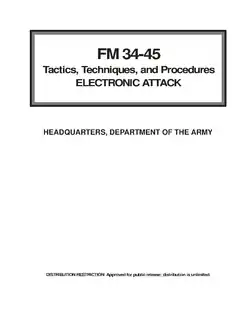United States Army Field Manuals
United States Army Field Manuals are published by the United States Army's Army Publishing Directorate. As of 27 July 2007, some 542 field manuals were in use.[1] They contain detailed information and how-tos for procedures important to soldiers serving in the field. Starting in 2010, the US Army began review and revision of all of its doctrinal publications, under the initiative "Doctrine 2015". Since then, the most important doctrine have been published in Army Doctrine Publications (ADP) and Army Doctrine Reference Publications (ADRP), replacing the former key Field Manuals. Army Techniques Publications (ATP), Army Training Circulars (TC), and Army Technical Manuals (TM) round out the new suite of doctrinal publications. Not all FMs are being rescinded; 50 select Field Manuals will continue to be published, periodically reviewed and revised. They are usually available to the public at low cost or free electronically. Many websites have begun collecting PDF versions of Army Field Manuals, Technical Manuals and Weapon Manuals.


Use of Field Manuals
Numerous field manuals are in the public domain.[2] Especially for people training survival skills (e.g., survivalists, adventurous travelers, victims of natural disasters) the US Field Manuals may be a valuable resource.
Wikifying the Field Manuals
According to The New York Times (14 August 2009), the Army has started to "wikify" certain field manuals – allowing any authorized user to update the manuals.[3] This process, specifically using the MediaWiki arm of the military's professional networking application, milSuite, was recognized by the White House as an Open Government Initiative in 2010.[4]
List of selected field manuals
- FM 6-22 Leader Development "The tenets of Army leader development provide the essential principles that have made the Army successful at developing its leaders."
- FM 1, The Army[A] – "establishes the fundamental principles for employing landpower." Together, it and FM 3–0 are considered by the U.S. Army to be the "two capstone doctrinal manuals."[5]
- FM 3–0, Operations[B] – The operations guide "lays out the fundamentals of war fighting for future and current generations of recruits."[1]
- FM 3-05.70 U.S. Army Survival Manual –Used to train survival techniques (formerly the FM 21-76).
- FM 3–0.5.130, Army Special Operations Forces Unconventional Warfare. Establishes keystone doctrine for Army special operations forces (ARSOF) operations in unconventional warfare.
- FM 5–31, Boobytraps – Describes how regular demolition charges and materials can be used for victim-initiated explosive devices. This manual is no longer active, but is still frequently referenced.
- FM 3–21.8, The Infantry Rifle Platoon and Squad
- FM 3–24, Insurgencies and Countering Insurgencies;– Published May 2014.
- FM 34-52, Intelligence Interrogation – Used to train CIA interrogators in conducting effective interrogations while conforming with US and international law. Updated in December 2005 to include a 10-page classified section as a result of the Abu Ghraib torture and prisoner abuse scandal. Replaced in September 2006 by FM 2-22.3, Human Intelligence Collector Operations.
- FM 3-21.20 – covers the Army Physical Fitness Test (APFT)
- FM 27-10 (1956) – Cornerstone of rules of war for the US Military. This manual was last modified in 1976 and is still used by the US military today.
- FM 3–25.150 (Combatives)
- FM 3–22.5 (Drill and Ceremony)
- Notes about Further Reading
- A. ^ Headquarters, Department of the Army (14 June 2005). FM 1, The Army. Washington, DC: GPO. OCLC 72695749. ("HTML" (www). "PDF" (PDF). "PDF-in-ZIP" (ZIP). Retrieved 31 August 2013.)
- B. ^ Headquarters, Department of the Army (14 June 2001). FM 3–0, Operations. Washington, DC: GPO. OCLC 50597897.
- — Part A: Begin – Chapter 4 (PDF). Archived from the original (PDF) on 14 July 2007. Retrieved 19 August 2013.
- — Part B: Chapter 5 – Chapter 9 (PDF). Archived from the original (PDF) on 14 July 2007. Retrieved 19 August 2013.
- — Part C: Chapter 10 – End (PDF). Archived from the original (PDF) on 14 July 2007. Retrieved 19 August 2013.
See also
References
- Gladstone, Brooke (27 July 2007). "Operation Hearts and Minds" (Interview with Michael D. Burke). On the Media. Missing or empty
|url=(help) ("Sound version" (sound). "Transcript version". Archived from the original (txt) on 25 May 2014. Retrieved 24 May 2014.) - U.S. Army. "Active Field Manual". Army Publishing Directorate. Archived from the original on 5 August 2010. Retrieved 22 August 2012.
- Noam Cohen. "Care to Write Army Doctrine? With ID, Log On". The New York Times. Retrieved 21 April 2012.
- "Open Government Initiative". Whitehouse.gov. Archived from the original on 15 August 2010. Retrieved 1 October 2012.
- Headquarters, Department of the Army (14 June 2005). FM 1, The Army (PDF). Washington, DC: GPO. Preface (p.iii). OCLC 72695749.
External links
| Wikimedia Commons has media related to U.S. Army Field Manuals. |
- Army Publishing Directorate homepage at army.mil -Free Field Manuals and other publications in .pdf format.
- AHEC Collection including Field Manuals available at the US Army Heritage & Education Center, Carlisle, Pennsylvania
- 500 Field Manuals online at SurvivaleBooks.com
- Incomplete list of active field manuals at army.mil
- Field Manuals online at globalsecurity.org
- What's an Army field manual? by Slate
- The U.S. Army Stability Operations Field Manual The U.S. Army, with forewords by Lieutenant General William B. Caldwell, IV, Michèle Flournoy, and Shawn Brimley and a New Introduction by Janine Davidson. Ann Arbor, University of Michigan Press, 2009.
- Military Manuals Collections on CD or download at eMilitary Manuals.com
- Army Field Manual, Appendix M, and Torture